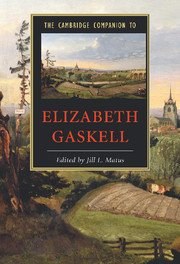Book contents
- Frontmatter
- 1 Introduction
- 2 The life and letters of E. C. Gaskell
- 3 Mary Barton and North and South
- 4 Cranford and Ruth
- 5 Elizabeth Gaskell’s The Life of Charlotte Brontë
- 6 Sylvia’s Lovers and other historical fiction
- 7 Cousin Phillis, Wives and Daughters, and modernity
- 8 Elizabeth Gaskell’s shorter pieces
- 9 Gaskell, gender, and the family
- 10 Elizabeth Gaskell and social transformation
- 11 Unitarian dissent
- 12 Gaskell then and now
- Guide to further reading
- Index
- Series List
10 - Elizabeth Gaskell and social transformation
Published online by Cambridge University Press: 28 May 2007
- Frontmatter
- 1 Introduction
- 2 The life and letters of E. C. Gaskell
- 3 Mary Barton and North and South
- 4 Cranford and Ruth
- 5 Elizabeth Gaskell’s The Life of Charlotte Brontë
- 6 Sylvia’s Lovers and other historical fiction
- 7 Cousin Phillis, Wives and Daughters, and modernity
- 8 Elizabeth Gaskell’s shorter pieces
- 9 Gaskell, gender, and the family
- 10 Elizabeth Gaskell and social transformation
- 11 Unitarian dissent
- 12 Gaskell then and now
- Guide to further reading
- Index
- Series List
Summary
What can you or I do? We are less than drops in the ocean, as far as our influence can go to re-model a nation.
Elizabeth Gaskell, “The Moorland Cottage” (1850)In Elizabeth Gaskell's story ''The Moorland Cottage'' (1850), Frank Buxton despairs of his power to change what he perceives to be the corruption of a ''nation whose god is money'' (MC, 7:61). Rather than working for change at home, he prefers the complete break, the fresh start of emigration to a ''newer and purer state of society'' in Canada or Australia (MC, 7:62). But his fiancée, Maggie Browne, assures him that if he stays, he will soon see ''some heroic action meeting with a nation's sympathy, and you will rejoice and be proud of your country'' (MC, 7:61). Heroic action, Maggie implies, has the power to redeem a corrupt society by example, by inspiring the average citizens - the mere ''drops in the ocean'' - to exert their influence for the better, and perhaps over time, to remodel a nation.
Gaskell's fiction is preoccupied with questions of social transformation. Her work as a whole contrasts two models of change: abrupt and violent on the one hand, slow and continual on the other. Violent change includes various degrees of resistance to tyranny, from the French Revolution, which is integral to ''My French Master'' (1853) and ''My Lady Ludlow'' (1858), to Frederick Hale's mutiny in North and South (1855), and the resistance to the press gangs in Sylvia's Lovers (1863). Gradual change includes the passing away of generations, families, even of ''races,'' and Darwinian evolution, the language of which became available for application to social change during Gaskell's career. Gaskell tracks gradual change in ''Morton Hall'' (1853), ''Traits and Stories of the Huguenots'' (1853), Cranford (1853), ''An Accursed Race'' (1855), ''A Dark Night's Work'' (1863), and Wives and Daughters (1866).
- Type
- Chapter
- Information
- The Cambridge Companion to Elizabeth Gaskell , pp. 148 - 163Publisher: Cambridge University PressPrint publication year: 2007
- 4
- Cited by

